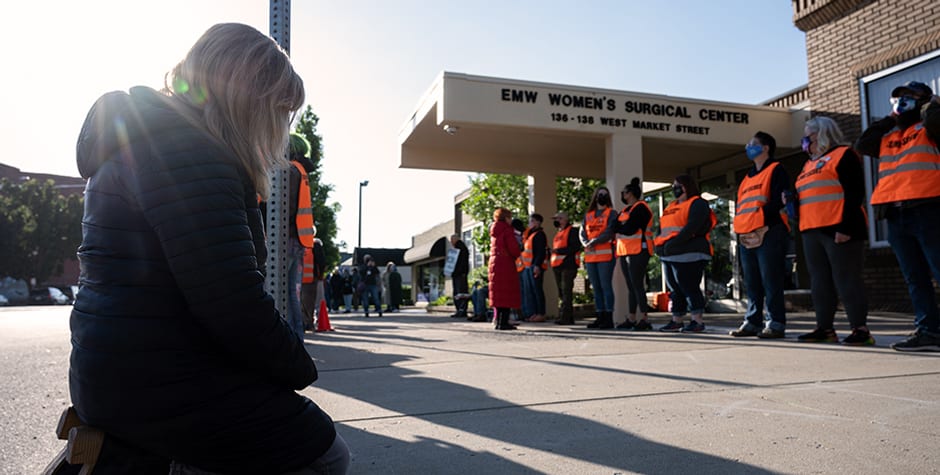Time To End Anti-Speech Bubble Zones and Allow Pro-Life Counselors To Save Lives
The ACLJ is filing an amicus brief urging the U.S. Supreme Court to grant review in a pro-life free speech case and to end, once and for all, the “floating bubble zones” being used to stifle pro-life sidewalk counseling outside various abortion businesses across the country. The current case is Vitagliano v. County of Westchester, but there’s a big backstory to the issue.
The Supreme Court, in the 2014 case of McCullen v. Coakley (in which the ACLJ filed an amicus brief), described the difference between pro-life picketers and sidewalk counselors:
Some of the individuals who stand outside . . . abortion clinics are fairly described as protestors, who express their moral or religious opposition to abortion through signs and chants. . . . [Sidewalk counselors] take a different tack. They attempt to engage women approaching the clinics in what they call “sidewalk counseling,” which involves offering information about alternatives to abortion and help pursuing those options. Petitioner Eleanor McCullen, for instance, will typically initiate a conversation this way: “Good morning, may I give you my literature? Is there anything I can do for you? I’m available if you have any questions.” If the woman seems receptive, McCullen will provide additional information. [These sidewalk counselors] consider it essential to maintain a caring demeanor, a calm tone of voice, and direct eye contact during these exchanges. Such interactions, [they] believe, are a much more effective means of dissuading women from having abortions. . . . In unrefuted testimony, petitioners say they have collectively persuaded hundreds of women to forgo abortions.
Of course, those “hundreds of women” who decided to “forgo abortions” represent lost revenue for abortion businesses. So it is no surprise that abortion proponents have pushed for various legal measures to hinder or halt sidewalk counseling. Among the most notorious are floating bubble zones, which make it a legal offense to approach close enough to converse quietly with, or offer a leaflet to, a woman absent advance permission from that woman.
One jurisdiction to enact floating bubble zone restrictions was the state of Colorado. When that happened, ACLJ attorneys challenged the state bubble law in federal court on behalf of some local sidewalk counselors, including lead plaintiff Leila Jeanne (“Jeannie”) Hill. We took Hill v. Colorado all the way to the Supreme Court, where, to our great dismay, a divided Supreme Court in 2000 upheld the floating bubble restrictions. In his dissenting opinion, Justice Scalia (joined by Justice Thomas) blamed the abortion distortion factor – the “ad hoc nullification machine” – declaring that “today’s decision is in stark contradiction of the constitutional principles we apply in all other contexts.” Justice Kennedy, also dissenting, declared that the Hill decision “contradicts more than a half century of well-established First Amendment principles.” Even pro-abortion Harvard Law Professor Laurence Tribe called the case “slam-dunk simple and slam-dunk wrong.”
Ever since that abysmal ruling, here at the ACLJ we have been looking for opportunities to get Hill overturned. One promising case arose in 2019 in Price v. City of Chicago, a challenge to Chicago’s floating bubble zone ordinance. In Price, the federal appeals court frankly recognized that Hill was “hard to reconcile” with other Supreme Court free speech cases but declared that Hill “remains binding on us.” As previously reported, we filed an amicus brief urging the Supreme Court to grant review in the Price case. The Court in 2020 declined to review the case.
Then along came Dobbs v. Jackson Women’s Health Organization. In that 2022 case, the Supreme Court overruled the 1973 Roe v. Wade decision that had invented a “right” to abortion. As we noted:
[I]ronically, our loss in a different case – Hill v. Colorado – helped [in Dobbs]. In Hill, we challenged an anti-speech “bubble zone” ordinance outside abortion businesses. The Supreme Court rejected our challenge in 2000. But in Dobbs, the majority used that terrible ruling as an illustration of how the Court’s abortion cases after Roe “have distorted First Amendment doctrines.” That means the Dobbs Court drew good out of a bad decision – using Hill against Roe – and in the process, plainly indicated that Hill is no longer valid as a First Amendment precedent.
Dobbs thus gave the green light to efforts to overturn Hill v. Colorado. And now, a new case is teeing up that very issue. In Vitagliano v. County of Westchester, a sidewalk counselor in New York State, Debra Vitagliano, is asking the Court to review her case and to discard Hill.
At the ACLJ, of course, we want to help! So we reached out to our client Jeannie Hill from the original Hill case and asked if she would join us on an amicus brief challenging the Hill decision. She agreed, and we have done exactly that in our new amicus brief. As we did in our prior brief in Price, we recount several major flaws (as if one was not enough!) in the Hill decision and urge the Supreme Court to grant Vitagliano’s petition for certiorari. You can read the whole brief here.
What happens next? The Supreme Court will presumably schedule the Vitagliano petition for consideration at one of its private conferences, probably in late October or early November. If at least four of the nine Justices vote to hear the case, then another round of legal briefing follows. Should that happen, you can bet we will be filing once more, asking the Court to undo Hill v. Colorado and to declare floating bubble zones to be what they are – flagrant violations of the First Amendment right to free speech.
Additionally, we are representing a number of other pro-life sidewalk counselors, fighting two separate abortion bubble zone cases out of New Jersey (Turco v. City of Englewood) and Kentucky (Harpring v. Louisville). We will keep fighting until Hill is overturned and pro-life counselors are free to continue their life-saving work unimpeded.
